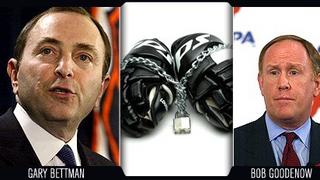 By Scott Burnside Special to ESPN.com
By Scott Burnside Special to ESPN.comThe NHL lockout may have been painfully pointless, but in the end it remains the easy part of the journey.
Now, on the eve of a historic new accord that will bring an end to the longest labor stoppage in the history of pro sports, comes the hard part -- restoring a once-great game to its place in the sporting universe. More to the point now comes the challenge of trusting the owners and players that ran this historic game into the ground to revive it.
So much work to do, so little faith in those who must do it.
"If we make a mistake here we're sunk," one NHL coach told ESPN.com this week.
It's always easier to tear something down, to smash something to smithereens, than it is to build, to create from nothing. Look at the ease with which players and owners allowed a dispute over how to divvy up $2.1 billion in revenues to swallow an entire season and jeopardize the future of a league that's been in operation for the better part of a century.
When a new collective bargaining agreement is unveiled in the coming days, the owners will emerge having ground the players' association into dust, imposing a salary cap significantly lower than the one offered on the eve of the season's cancellation in mid-February. The players' shocking offer of a 24 percent rollback on existing contracts will also be part of the new deal, as will restrictive entry-level salaries and a revamped arbitration process. Yet anyone who claims victory in the wake of the lockout is a fool -- pure and simple.
It's believed the new salary cap will peg player salaries at 54 percent of league revenues, assuming $1.7 billion in revenues for the coming season. But that's merely an educated guess. The truth is the damage to the sport is somewhere between a lot and incalculable. Similarly, the work needed to be done to undo or mitigate that damage exists somewhere between those two poles.
The league has been forced to give away its product to NBC in a manner more befitting a common streetwalker. And that's the good news on the television front, where ESPN's decision to walk away from the league leaves the NHL without any national cable presence in the United States. Finding a way to beam its new and improved product into American homes will be just one of a series of crucial tasks facing the league, its players and its owners in the coming weeks.
The media across most of the United States have for weeks treated the league and its lockout as an elephant might consider a gnat -- small, buzzing, mildly annoying, but ultimately inconsequential.
How will the league restore interest on Web sites, in newspapers and in magazines, many of which have already decided the NHL doesn't warrant coverage provided other major sporting leagues?
Sponsors will expect cut-rate deals to come back, assuming they can be convinced to hang around for the new show.
Teams must reach out to fans and make their buildings welcoming places in a way they have never done before -- starting with reduced ticket prices.
The product itself must be better, the rule changes dramatic and enticing.
So much work to do. And it has been encouraging to hear that players, owners and managers finally appear to be on the same page in repairing the product itself.
Shootouts to break tie games, a more exciting overtime format, smaller goalie equipment, the elimination of the red line, wider blue lines and restrictions on goaltenders' handling of the puck are all solid ideas.
But this is a league that has a long history of seeing great ideas unraveled by inertia and selfishness.
Check the history books.
As recently as the fall of 2002, the league hosted a rules "summit" in Toronto, after which claims of a golden age of scoring were made. The promises of a more exciting game yielded nothing but more clutching and grabbing as the season lurched toward the playoffs when all bets were off. And when calls were made, coaches and general managers complained that officials were idiots and their teams treated unfairly.
Even the new competition committee made up of four active players, four general managers and one owner (Philadelphia's Ed Snider), has been quietly ripped because coaches and on-ice officials have been excluded.
In the past few days there have been signs the hockey world is creaking and shuddering back to life:
• The Leafs re-upped coach Pat Quinn and hired former Carolina coach Paul Maurice to coach their AHL team.
• The Blackhawks confirmed Dale Tallon as their general manager, who then canned coach Brian Sutter and named Trent Yawney his favorite to fill the position.
• The Senators extended general manager John Muckler's deal.
• Barry Trotz and Dave Tippett saw their jobs secured in Nashville and Dallas, respectively.
• Mike Kitchen will be back behind the St. Louis Blues' bench.
Like crocuses poking their heads through the spring frost, these are signs that the lockout freeze is thawing. And so there is, finally, a quiet buzz surrounding the NHL.
But unlike previous years, this buzz is flavored by fear. It is the fear that comes from knowing there are no second chances now. The fear that comes from knowing every mulligan has been used up by the lockout. From the moment the league's "a whole new game" marketing campaign is announced on through the draft lottery, draft, free-agent frenzy and on into training camp, there can be no missteps.
So much work to do. The stakes so frighteningly high.
Scott Burnside is a freelance writer based in Atlanta and is a frequent contributor to ESPN.com.

No comments:
Post a Comment